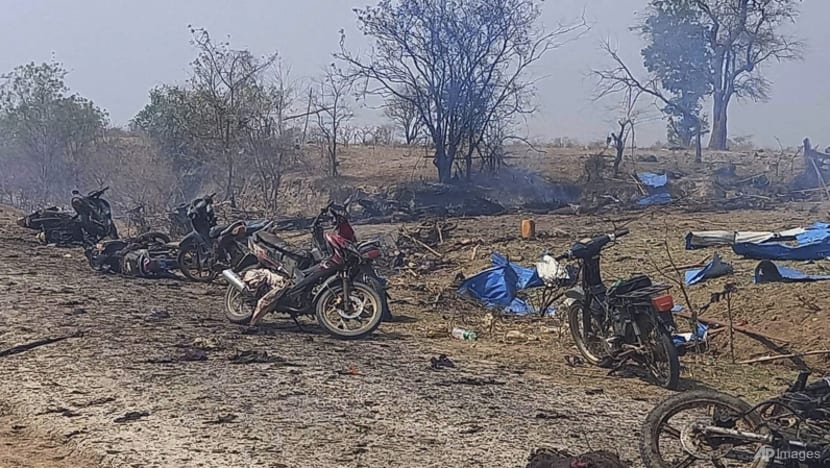Indonesia ‘proactive’ but ‘slow’ in dealing with Myanmar as ASEAN chair, say analysts
The Five-Point Consensus, ASEAN's peace plan for Myanmar, remains the essential baseline for any kind of solution, said one analyst.

The aftermath of an airstrike in Pazigyi village in Sagaing Region's Kanbalu Township, Myanmar, on Apr 11, 2023. (Photo: Kyunhla Activists Group via AP)
Indonesia has been proactive in dealing with the crisis in military-ruled Myanmar as chair of the Association of Southeast Asian Nations (ASEAN), but it has been slow in finding a way forward, analysts said.
Their comments came on the back of an air strike by the military junta on Tuesday (Apr 11) that is estimated to have killed more than 100 people in a remote village in Myanmar.
Two days later, ASEAN released a statement strongly condemning the attack in its member country.
“The Indonesian government … has been proactive. They're very strongly democratic,” said Associate Professor Simon Tay, chairman at think tank Singapore Institute of International Affairs.
However, he wants to see the country do more, he told CNA’s Asia First on Friday.
“I am hoping … they will galvanise not only the pro-democracy forces, especially from the West, but also reach out to more conciliatory forces (to the Myanmar military) in Thailand to keep ASEAN unified and on track,” he said.
He added that a new attempt must be made to bring on board China, Japan, South Korea, as well as neighbouring countries sharing a border with Myanmar.
These nations, along with organisations with investments in the country, are likely to have more suasion on the military and other actors on the ground in Myanmar.
“This is perhaps something that should be tried by ASEAN as we move forward with this very difficult and prolonged problem,” he said.
ASEAN HAS BEEN “INEFFECTUAL”
While ASEAN has been viewed as the key framework to find a way for dialogue and progress out of the crisis and violence, it has been “ineffectual”, said Professor Thitinan Pongsudhirak from the Institute of Security and International Studies at Chulalongkorn University.
“The ASEAN Five-Point Consensus has not worked. Indonesia has chairmanship, with a lot of hype and hope on it, but it's very slow and not making forward movements," he said.
Prof Pongsudhirak said that it is “unlikely” that ASEAN will change its strategy and that there is a lot of “global frustration” about the regional bloc now.
“Initially the international community deferred to ASEAN to deal with Myanmar on the coup and the crisis. But now that ASEAN proves impotent, ineffectual, I think the global efforts might have to go beyond us,” he told CNA’s Asia Now on Thursday.
THE FIVE-POINT CONSENSUS
Indonesia kicked off its chairmanship at the beginning of this year with the Myanmar crisis as priority. Key to Jakarta’s plan was the implementation of the Five-Point Consensus.
The Consensus is ASEAN's peace plan for Myanmar, which was agreed on by all 10 leaders in Jakarta in April 2021, two months after the military coup.
While the Myanmar military regime has not honoured its part of the peace agreement - which includes an immediate end to violence - about two years on, Indonesia said in the past three months, it has facilitated the reopening of communication and consultation with various “stakeholders” on humanitarian aid to Myanmar.
This will allow the ASEAN Coordinating Centre for Humanitarian Assistance on Disaster Management (AHA Centre) to provide aid to those who require it in Myanmar, regardless of their ethnic background, religion or political orientation.
Providing aid through the AHA Centre is one of the items on the Five-Point Consensus. Indonesian Foreign Minister Retno Marsudi had called the development a breakthrough.
MAKING “HARD CHOICES”
The Five-Point Consensus remains the essential baseline for any kind of solution, said Assoc Prof Tay.
However, ASEAN is now at a juncture where it must make some “hard choices”, said Prof Pongsudhirak.
“Does it keep the Myanmar military government within the fold, within the grouping, or does it take measures, more drastic measures to isolate the regime and regroup around a core ASEAN that can still be respected and workable in the eyes of the international community?” he asked.
On possible efforts for ASEAN to mediate with military generals at a summit next month, he said that the junta is playing “a one-sided game”.
“All the actions or the negotiations are under their terms. It's not a board game that is inclusive. It is either that game or no game,” he said.
“It's very clear that ASEAN has to do something different. So far, it has been unwilling to do so. At the same time, ASEAN also risks going in the wrong direction.”
Some ASEAN member states are “condoning and even coddling the military government” by meeting and giving them space and legitimacy, he said, without naming any country.
“That is a deep, deep existential crisis for ASEAN about what to do with Myanmar,” he said, adding that the “worst thing” the bloc could do is condone the junta’s violence against its own people.
“We have to look for Indonesia to do something faster and stronger,” he said.
However, he cautioned that it could be “too little too late”, and that if things do not improve, ASEAN could lose its credibility in the eyes of the international community.
















